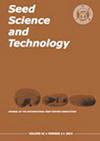The role of skill in successful germination of Melia volkensii seeds
IF 3
4区 农林科学
Q2 AGRONOMY
引用次数: 0
Abstract
Melia volkensii (Melia), locally known as Mukau in Kenya, is an important indigenous dryland forestry species. The species is propagated primarily through seeds, with germination percentage ranging from 40-90%. Successful germination of seeds of forestry species requires skillful application of appropriate pre-sowing treatments. Studies that document and quantify the effect of skill/experience on the germination outcomes for tree seeds are rare. This study sought to fill this gap by documenting the results from a capacity building exercise on testing M. volkensii seeds. Seeds were collected from the KEFRI Kibwezi seed orchard, pretreated and sown by seven participants with different skill levels based on years of experience. The seeds were sown in glasshouse and nursery conditions. There were significant differences (p < 0.001) in germination capacity, mean germination time, T50, mean germination rate, mean daily germination (MDG) and peak value (PV) depending on the skill level of the participants. The results also varied between germination environment (p < 0.001) for all germination traits except MGD and T50. The highest germination outcomes were recorded for participants with the longest experience in testing of M. volkensii seed germination. These findings therefore signify the importance of skill/experience in germination of M. volkensii seeds, an outcome that may have implications for other forestry seeds with special pre-sowing requirements.技巧在苦楝种子成功发芽中的作用
Melia volkensii (Melia volkensii),肯尼亚当地称为Mukau,是一种重要的本土旱地林业树种。本种主要通过种子繁殖,发芽率在40-90%之间。林业树种种子的成功发芽需要熟练地应用适当的播前处理。记录和量化技能/经验对树木种子发芽结果影响的研究很少。本研究试图通过记录一项关于检测volkensii种子的能力建设活动的结果来填补这一空白。种子是从KEFRI Kibwezi种子果园收集的,由7名不同技术水平的参与者根据多年的经验进行预处理和播种。种子在温室和苗圃条件下播种。发芽量、平均发芽时间、T50、平均发芽率、平均日发芽量(MDG)和峰值(PV)在不同技术水平上存在显著差异(p < 0.001)。除MGD和T50外,其他发芽性状在不同萌发环境下也存在差异(p < 0.001)。最高的发芽结果记录的参与者与最长的经验,在测试M. volkensii种子发芽。因此,这些发现表明了技能/经验在volkensii种子发芽中的重要性,这一结果可能对其他具有特殊播种前要求的林业种子具有启示意义。
本文章由计算机程序翻译,如有差异,请以英文原文为准。
求助全文
约1分钟内获得全文
求助全文
来源期刊

Seed Science and Technology
农林科学-农艺学
CiteScore
3.00
自引率
28.60%
发文量
36
审稿时长
>36 weeks
期刊介绍:
Seed Science and Technology (SST) is an international journal featuring original papers and articles on seed quality and physiology related to seed production, harvest, processing, sampling, storage, genetic conservation, habitat regeneration, distribution and testing. A journal that meets the needs of researchers, advisers and all those involved in the improvement and technical control of seed quality. Published every April, August and December.
 求助内容:
求助内容: 应助结果提醒方式:
应助结果提醒方式:


